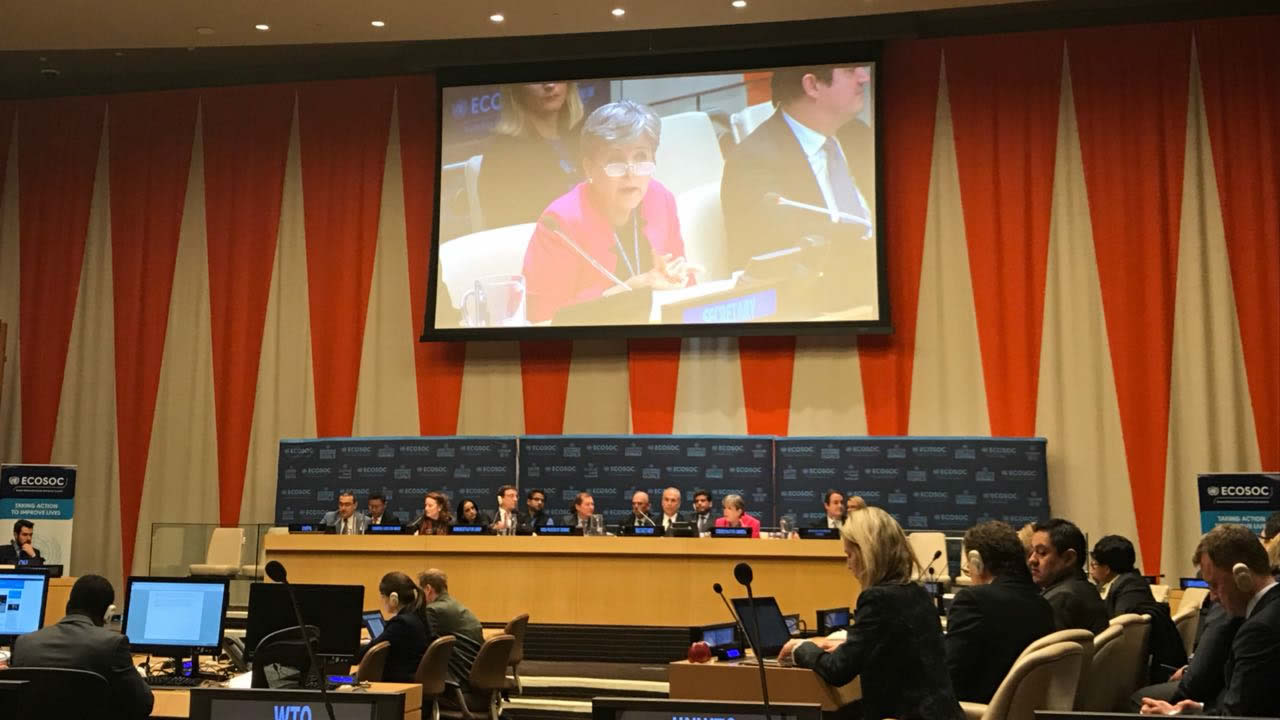Alicia Bárcena Highlights the Role of Regional Commissions as Intergovernmental Platforms that Connect National and Regional Realities with the United Nations System
ECLAC’s Executive Secretary participated today in a dialogue with executive heads of the UN development system, in the framework of the meeting of the Economic and Social Council’s Development Segment that is being held in New York.

The Executive Secretary of the Economic Commission for Latin America and the Caribbean (ECLAC), Alicia Bárcena, highlighted today in New York the role of the United Nations regional commissions and their three key functions: as intergovernmental platforms, as generators of ideas and innovation, and as bearers of technical cooperation on the three dimensions of sustainable development.
The gathering brought together the heads of agencies such as the United Nations Development Programme (UNDP); the United Nations Children’s Fund (UNICEF); the World Food Programme (WFP); and the International Labour Organization (ILO); as well as the current coordinating body of the five regional commissions, which is being headed by ECLAC in 2018.
During the interactive dialogue with countries – held in the framework of the meeting of the Operational Activities for Development Segment of the multilateral organization’s Economic and Social Council (ECOSOC) – Ms. Bárcena underscored that while the implementation of the 2030 Agenda requires action at a national level, above all with regard to the social dimension, globalization has profoundly transformed the context in which countries can access the means of implementation, such as financing and trade.
She sustained that the regional commissions can facilitate the substantive integration that is needed to comply with the 2030 Agenda on economic, social and environmental matters, particularly through the analysis of specific challenges associated with its implementation.
Bárcena stressed that “the commissions have the statistical capacities to support member countries and their national statistics systems to achieve periodic monitoring and the evaluation of progress on the SDGs, their targets and indicators.”
On this point, she highlighted how important it is for the United Nations regional commissions and agencies to unify data and analyses, to consolidate a single voice in response to member States’ requests, and to facilitate the evidence-based processes of policy formulation and decision-making.
For example, she added that although some of the means of implementation of the 2030 Agenda are articulated at a national level, many of them in fact operate on an international, global and regional scale, among them, trade, financing and technology.
Alicia Bárcena affirmed that while globalization has resulted in important benefits in relation to overall levels of poverty reduction in many countries, it has also created challenges, such as the growing concentration of wealth in a few hands and, with that, an increase in multiple inequalities.
“The complexity and interdependence of the current world order lead to conceiving of sustainable development as a process that goes beyond the national dimension, where economic, social and environmental challenges must be addressed not only by developing countries but in a universal manner,” she stated.
ECLAC’s Executive Secretary recalled that the United Nations regional commissions already took concrete measures to reorient and align their work programs with the 2030 Agenda and be more efficient in executing their resources through the governing bodies of the United Nations Secretariat by adapting their structures and realigning with the 2030 Agenda for Sustainable Development.
She also highlighted that the regional commissions have three interconnected functions: for intergovernmental convocation, acting as a think-tank, and for technical and operational support.
“As we carry out our functions, we focus on providing our value added to countries, such as the inclusive and universal nature of our platforms as solid building blocks for multilateralism, the multi-sectoral nature of our products offering analysis and knowledge, our development of capacities and policy guidance, and support for regional, South-South and triangular cooperation and integration efforts at a regional and subregional level,” the senior United Nations official stated.
With regard to the convocation-related function, she underscored the creation in 2016 of the Forum of the Countries of Latin America and the Caribbean, the second meeting of which will be held in April at ECLAC’s central headquarters in Santiago, Chile. The forum represents a multi-actor platform for peer learning on the implementation and follow-up of the 2030 Agenda at a regional level, and serves as an important bridge between the national and global levels, particularly as a contribution to the High-level Political Forum on Sustainable Development.
Finally, Bárcena stressed the importance of the commissions’ activities at a subregional level, pointing to ECLAC’s actions in the Caribbean and in Central America, and the significance of achieving effective coordination between the Funds and Programs, the Specialized Agencies and the Regional Commissions based on their mandates and capacities.
Country(ies)
- Latin America and the Caribbean